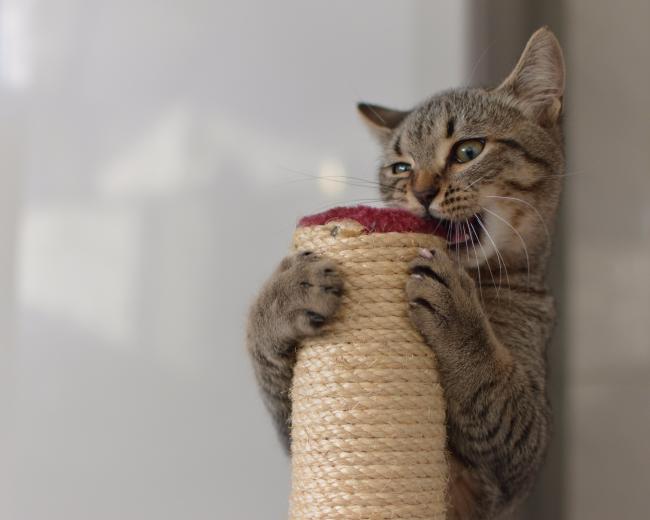Cats can sometimes show really cheeky behavior: meowing, begging or throwing your stuff on the floor. But why? What makes your cat push objects off tables, and how can you stop the begging and 4am wake-up calls? This is also an important discussion to have with your cat sitter, so they know what to do when caring for your cat. Here are our top 3 tips to minimise cheeky cat behaviour
Asking for attention
First of all: why do some cats show this pushy behaviour? Although cats are normally solitary, they can actually be quite social little creatures who are able to read human body language quite well. Cats that whine or beg always have a very specific goal: they may be seeking attention or food, or they have something else they want to tell you. We usually give into their demands very quickly, even if we don't mean to. We react if our cat sits on our laptop - maybe by pushing them off the keyboard or talking to them. If your cat meows late at night, you get out of bed to let them into the bedroom or shoo them away.
Negative attention is also attention: a cat that scratches your expensive furniture does this very consciously because you will respond. If your cat sits in front of the computer screen while you are working, he or she does so to get a reaction from you. Your cat is not only smart but also very patient - puss will continue this behavior until you give in. Needless to say, your cat does this from a place of love - they simply want your attention and affection. Yet the naughty behaviour can be very annoying and disruptive to the bond between you and your cat (and your sleep!).
Knocking things over
Knocking random stuff off tables is very common cat behaviour. A pen, your phone or that expensive vase - cats like to push objects off tables and onto the floor. There are 2 possible explanations for this behaviour. First of all, moving small objects is like playing with prey. To 'practice' this, the cat pushes the pretend 'dead prey' (like your phone) onto the floor. A second explanation is again attention: you respond to the behavior by getting cranky, picking up the object or laughing. Plus, whatever you were doing was interrupted. Mission complete :-)
Behaviour such as knocking things over, meowing or begging varies between cats: not every cat shows this behaviour to the same extent. Are you planning on using a cat sitter? Discuss with him / her the habits and character of the cat beforehand, so that he or she can take this into account during the home visits.
Boredom and stress
Cats sleep an average of about 18 hours per day, but that doesn't mean that they are lazy! All those naps are very useful for those moments when they are awake and alert enough to hunt and play. Cats that aren't able to enjoy their daily playtime and get rid of their energy might get bored at some point. This can lead to undesirable behavior such as scratching furniture, urinating indoors and even aggression. Also, stress factors like other pets, loud noise, or small children might make your cat feel uncomfortable. Therefore, ensure a calm environment and avoid as many stress factors as possible. Make sure the cat has enough safe spots to retreat to and can enjoy his or her daily playtime, climbing and cuddling. Read more about stress symptoms and how to reduce it.

To stop cheeky behaviour: Our top 3 tips
1) It is difficult, but it is important to NOT give your cat attention in the event of the undesirable behaviour. At most, quietly pick up your cat and move them to a different location away from the cause. Even though the behaviour might be funny, weird or annoying, try to ignore your cat totally. It may take some time to break the habit, but it will work as soon as the cat realizes that the persistent behaviour (begging, whining, meowing) doesn't actually work on you.
2) Is your cat a beggar? Some cats can behave very dramatically when it comes to food. If your cat gets enough food to eat - try to ignore the dramatics! But also keep in mind that cats that are on a strict diet, are very active or a bit stressed out can also be hungry. Try to divide the meals a bit more over the day, give small portions more often (rather than one big meal) and check with your vet if your cat really gets enough food. Also, if your cat meows a lot or more than usual, it is important that you check if your cat is in pain. Read how to check if your pet is sick or in pain.
3) You can prevent your cat from getting bored by providing plenty of stimulation and regular play-time. You don't have to play with your cat for hours - a few minutes two or three times a day should be enough. Do this at times when your cat is very active and really in the mood to play. Cats are active mostly during the evening and early in the morning. Hunting games with a string or laser pointer are usually winners, you can also hide catnip in your cat's toys. It's also a good idea to rotate your cat's toys so that they can enjoy 'new' toys from time to time. Make sure your cat is mentally challenged and can enjoy chasing and jump after something that represents 'prey' - try throwing little cat treats around the house for your cat to chase after. Boxes, cat tunnels and climbing poles are great ways for your cat to explore and enough physical exercise indoors. Want to make your own cat toys? It's very easy.
Cats that are mentally challenged and behave as they naturally would are far less likely to scratch your furniture or get up to too much mischief. Be sure you provide enough scratching poles for your cat to get their claws into. Are you leaving your cat home alone for a few days? Then be sure to book a loving, devoted cat sitter who will really take the time to provide your cat with food, daily playtime and cuddles.




